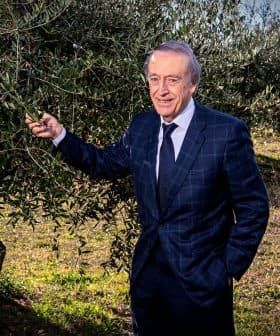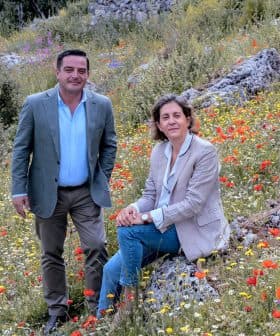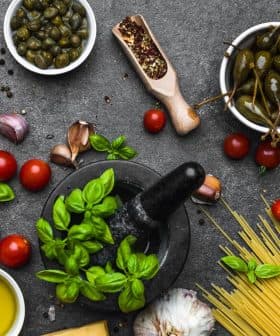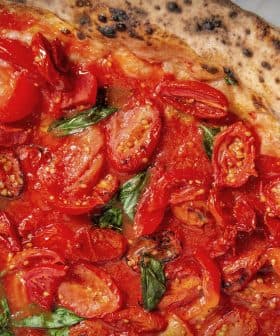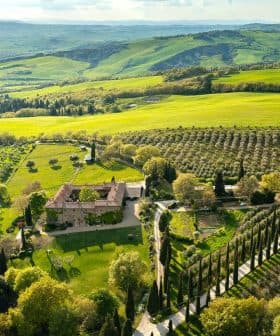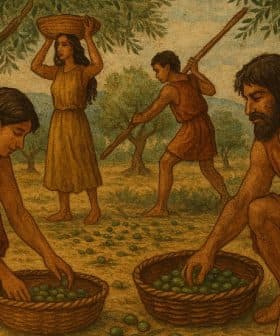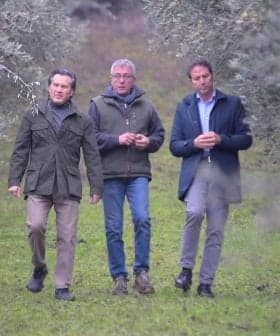Producers Behind San Giuliano Pursue Quality Through Innovation
On Sardinia, Pasquale and Domenico Manca produce organic extra virgin olive oils sustainably using state-of-the-art technology.
 San Giuliano’s super-high-density olive groves
San Giuliano’s super-high-density olive groves San Giuliano, established in 1916 by Domenico Manca and his son Pasquale, has become a renowned producer of high-quality Italian olive oils, with five awards at the 2021 NYIOOC World Olive Oil Competition. The company, located in Sardinia, has a long history of innovation and collaboration with researchers to enhance production, expand their olive groves, and promote sustainability through organic practices and responsible resource management.
It all began in 1916 when Domenico Manca and his son, Pasquale, established an olive press in the historic center of Alghero, where they also managed an olive grove.
Fast forward 106 years and San Giuliano has become an ambassador of high-quality Italian production to the world, with a long history of success with five extra virgin olive oils awarded at the 2021 NYIOOC World Olive Oil Competition.
“We are constantly evolving. I can say that we are modern farmers based on solid roots, and yet strongly oriented to all the tools provided today by the world of research and technology.
“Our family has been cultivating olives in this countryside since the late 1800s,” said Pasquale Manca, who, along with his father, Domenico, share their respective grandfather’s names and dedication to the land.
“Originally, some parcels were dedicated to producing wheat and milk, but, over the years, they specialized in olive farming, which has become the company’s core mission,” he added.
See Also:Producer ProfilesNestled in the northwestern corner of Sardinia, the second-largest island in the Mediterranean Sea, the farm has a state-of-the-art mill at its heart, equipped with four milling lines. It covers more than 400 hectares of groves between Alghero and Sassari. With 180,000 olive trees already, the family plans to continue expanding production.
Looking back over the producers’ history, they were already thriving when World War II began and their facilities were hit by heavy bombing. Even though the dreadful event led to a standstill in their farming activities, it did not stop the family’s enterprising spirit.
“My father returned to San Giuliano, where the farm is located, in the early 1970s,” Manca said. “Not only did he restore the company, but he started a true revolution, setting up the first continuous cycle oil mill of the region.”
At that time, the new technology drew much attention, generating curiosity and diffidence. The oils produced with the cold-press system were more intense, unlike those previously obtained with the traditional method.
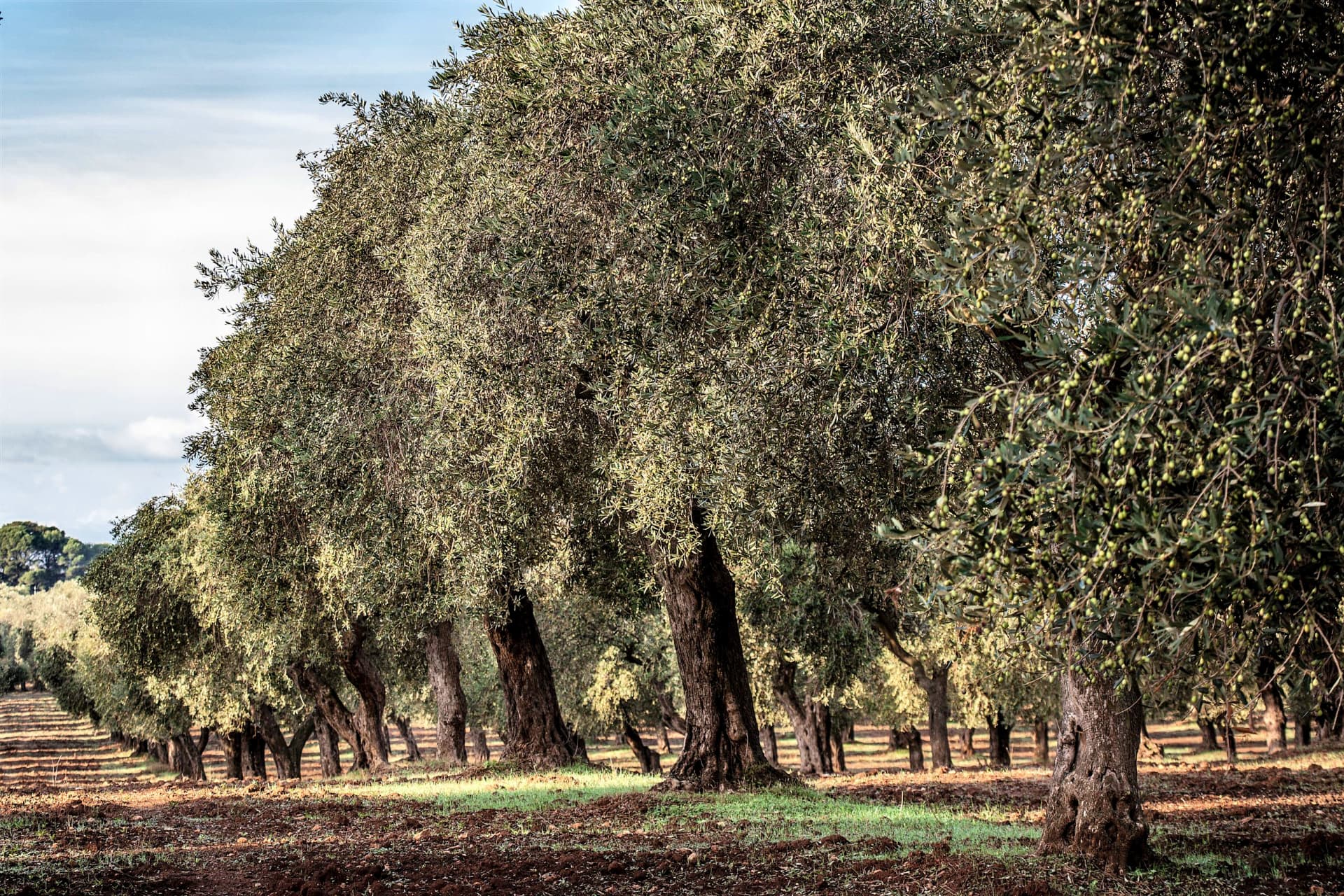
San Giuliano’s traditional olive groves
“Now we crush our olives exclusively, but we have been working with third parties for some time,” Manca said. “The new mill produced more aromatic and pungent oils, which represented such a change from the past that at first several farmers showed a certain reluctance.”
Still, the project was immediately characterized by efficiency and accountability, which helped the growers to overcome their initial hesitancy and trust the groundbreaking intuition.
“The rest, in terms of development of production technology, is history,” Manca said.
Innovation and research have always been the focus of the company.
“We work in close collaboration with the University of Sassari,” Manca said. “We constantly keep ourselves up to date. For example, three years ago, we installed new machinery, which the manufacturer designed according to our needs, providing us with a unique set-up in its category.”
Ultrasound is the last innovation applied to the cutting-edge milling plant. No detail is left to chance at San Giuliano.
“I like saying that we strive to give our best in terms of technology, but also from an aesthetic point of view,” Manca said. “We want those who enter our mill to find a clean-cut and welcoming environment.”
When the right time comes, fruits are harvested and carried to the facility in small bins.
“Also transport, storage and handling of the olives are subject to series of small but fundamental steps that contribute to the quality of our productions,” he said. “All of this certainly does require an extra portion of care in the work.”
Stretching from the sea to the innermost areas, San Giuliano’s olive groves are made up of both native and international cultivars such as Bosana, Semidana, Nera di Oliena, Coratina, Arbequina and Arbosana.
“The territorial variety of the farm certainly requires a great deal of work from both an agronomic and an entrepreneurial point of view,” Manca said. “Yet all these olive groves, often located far from each other, with different exposures to wind and sun, provide a wealth of organoleptic profiles with their wide diversity and richness of aromas.”
“We think that a state-of-the-art company should comprehend different management models of the olive grove,” he added.
Manca also said they adopted three different planting systems: traditional, high-density (intensive) and super-high-density (super-intensive).
“Now, after a slight delay due to the Covid-19 pandemic, we are working on a further part of the land at high-density,” Manca said. “It is a fourth pattern that we are experimenting with a group of researchers.”
The idea is to enhance the production to meet different tastes and demands. With this aim, another 100 hectares will be added to the property, comprising more than 200,000 trees.
Over the years, several parcels have been added to an original nucleus of historic olive groves.
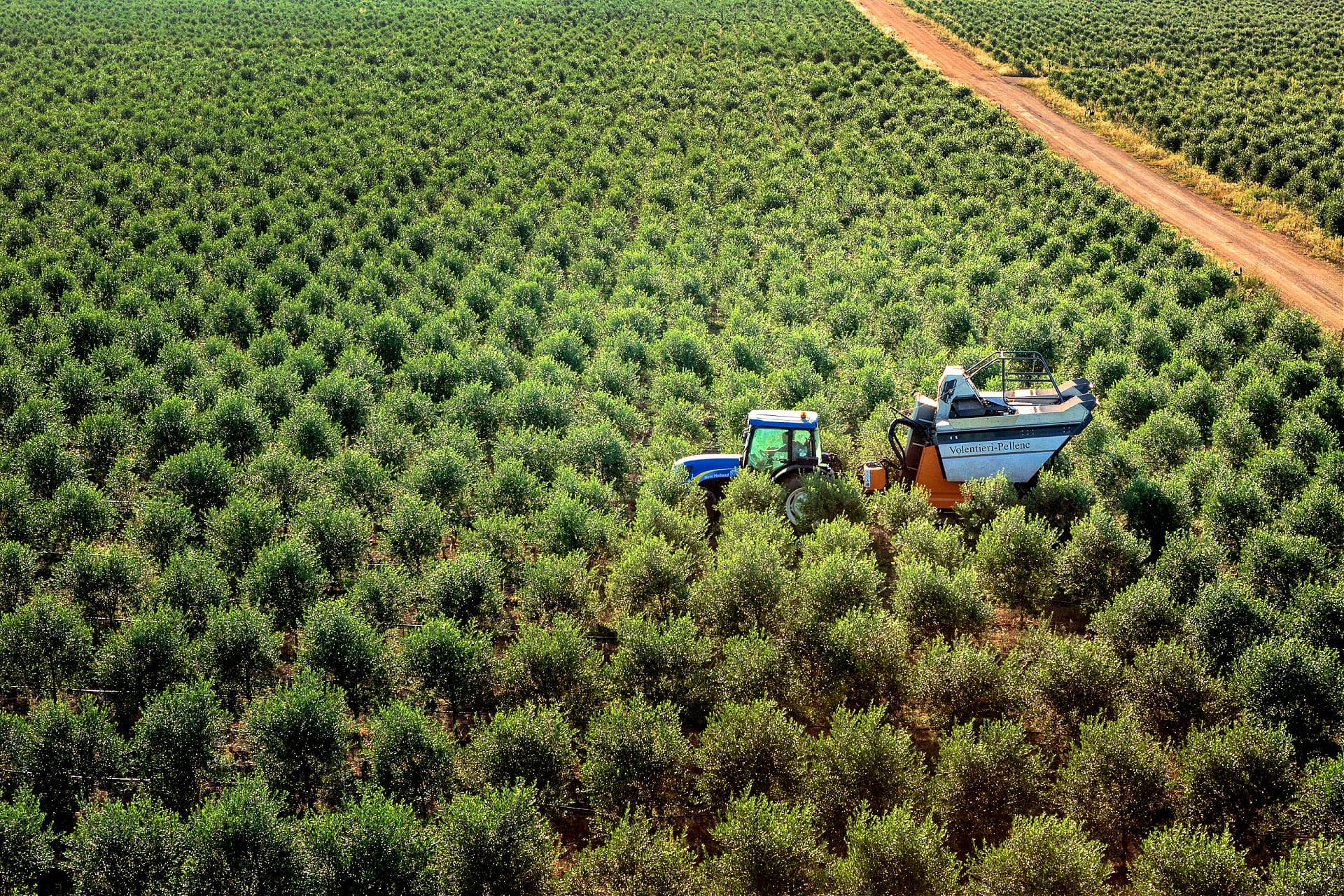
Harvesting olives in San Giuliano’s super-high-debsity olive groves
“We have kept all the centuries-old olive trees and their traditional patterns,” Manca said. “It is worth saying that the tradition of sheep and goat farming goes back thousands of years in Sardinia.”
“In the flatlands of La Nurra, which extends for dozen of hectares, many farmers dismissed their plots over the last few years,” he added. “Then we acquired some of these lands, which had always been used only for grazing, and we planted new and more rationalized olive groves. We also carried out improvements in this area, including creating a drainage system.”
The whole property is organic and managed with a focus on the responsible use of resources.
“We utilized all the olive processing residues,” Manca said. “Pits are used for heating the facilities, pomace provides energy in the form of biomass and a part of it which is very rich in polyphenols is saved for the cosmetic sector. In the context of by-products, another new project surrounding nutrition is in the pipeline.”
Water use is limited both in the two-phase mill and in the field.
See Also:The Best Olive Oils from Italy“We adopt Agriculture 4.0 technologies,” Manca said. “We are careful not to waste water and rely on an almost surgical drip system.”
In collaboration with the regional agency for agricultural research, they are also setting up sensors on the plants to detect if and when they need water. Still, in terms of sustainability, an experimental project has been scheduled to set up an agro-photovoltaic system in a small portion of the property.
“We are constantly evolving,” Manca said. “I can say that we are modern farmers based on solid roots, and yet strongly oriented to all the tools provided today by the world of research and technology that must be used to be on the market at 360 degrees.”
“I would say that, in order not to be marginal and competitive, you must use all the solutions that the research in this sector offers,” he added.
“Over the last decades, in the Alghero area, there has been a growth in professional olive growing,” Manca continued. “There are some farmers like us who are doing an excellent job. We do not want to work only for our own business, we indeed employ many people and transfer our knowledge to them, and this aspect of a shared benefit is very important to us.”
“Together with our staff, we conduct or take part in many operations such as planting new groves, and even if it costs us more and requires a greater effort, it is worth it because it allows us to create and share a rich knowledge heritage,” he concluded.
Share this article


